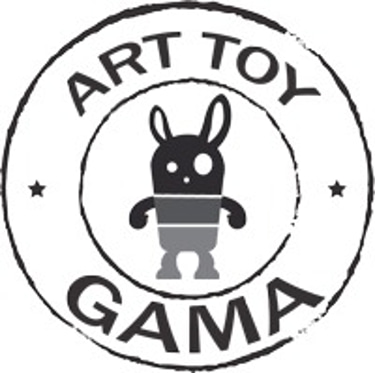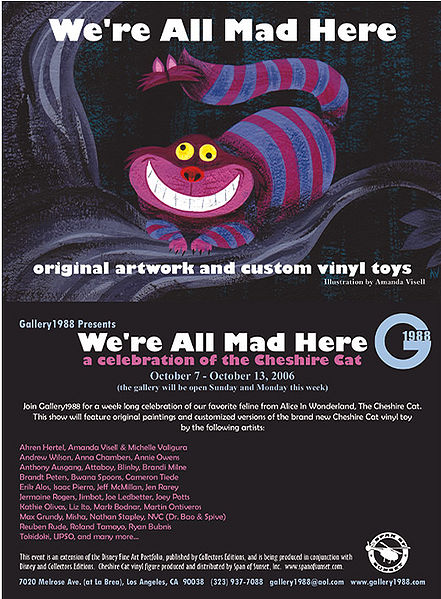We didn’t lose our inner child. We turned it into ArT Toys and More...with purpose.
🌀 We’re All Mad Here Art Toy Exhibition
When a Smile Became the Weapon of Art Toy Legitimacy...We’re All Mad Here Exhibition...from Gallery 1988...Los Angeles (2006) #00016 — TNoTToys Publications
TNOTTOYS PUBLICATIONS1000 ICONIC ART TOY EXHIBITIONSTNOTTOYS
Sergio Pampliega Campo & Cristina A. del Chicca
🌀 This post is part of an ongoing research series from Art Toy Gama’s editorial division:
📚 This Is Not a Book About Art Toy Exhibitions & ToyCons
Context — LA, 2006: The Pop Wedding of Madness
October 2006. Melrose Avenue, Los Angeles.
Gallery1988, still fresh, still rebellious, became the unlikely altar where lowbrow Art, Vinyl Toys, and corporate myth exchanged vows.
The exhibition “We’re All Mad Here: A Celebration of the Cheshire Cat” marked a rare mutation point in the Designer Toy Movement.
Kidrobot had already turned vinyl into a collectible culture. But this show did something no one expected:
it brought Disney into the underground, and the underground didn’t bow; it danced.
Through the collaboration between Span of Sunset, Inc. and Disney Fine Art, the Cheshire Cat became a designer platform Toy.
Produced officially under license, sculpted by Monster5, and celebrated through paintings, prints, and custom figures,
the show was both rebellion and recognition.
For the first time, corporate IP met artistic subversion on equal ground.
POSTER Reading — What the Smile Really Says
The exhibition POSTER, illustrated by Amanda Visell, is pure theater:
a fuchsia and violet Cheshire Cat grins in midair, eyes burning yellow like stage lights.
Its tone isn’t nostalgic; it’s conspiratorial.
The words “We’re All Mad Here” float like a diagnosis and an invitation.
It wasn’t advertising; it was Manifesto.
The subtext was clear: You’re not crazy. You’re part of this.
And at the bottom, the fine print whispered history:
“Cheshire Cat vinyl figure produced and distributed by Span of Sunset, Inc.
An official part of the Disney Fine Art Portfolio.”
That line changed everything.
It confirmed what no one thought possible: that the most guarded IP fortress on Earth had just opened its gates to the ArT Toy Movement.
What the Exhibition Showed: Mutation Made Visible
Inside Gallery1988, the madness was physical.
More than 30 artists reinterpreted the new Span of Sunset x Disney Cheshire Cat vinyl figure,
each turning it into a sculptural hallucination.
Some dissected the smile into geometry.
Others stretched its grin into full-blown abstraction.
Each custom Toy became both artifact and act of rebellion.
Walls displayed original paintings, limited prints, and sketches, tying the Toys to their mythological roots in Pop Surrealism.
This wasn’t merch.
It was a visual carnival, part Art Show, part social ritual —
a week-long storm of collectors, drops, and unfiltered energy that predated Instagram but already lived on hype.
It was the moment vinyl met legitimacy, without losing its nerve.
Why It Mattered: The Bridge Between Subculture and Corporation
This was the Exhibition that made Disney blink.
For decades, the company had policed its icons with surgical precision.
Yet here, under the neon of Melrose, its Cheshire Cat : a global mascot of absurdity, was being dismantled,
painted, re-coded, and re-born by underground artists.
It wasn’t parody; it was partnership.
That shift mattered.
It proved that the Designer Toy Movement wasn’t just an aesthetic: it was an artistic language capable of negotiating with giants.
It showed that lowbrow wasn’t lesser; it was louder.
Artists like Joe Ledbetter, Tokidoki, Jermaine Rogers, Brandie Milne, Amanda Visell, and others were no longer just customizing ArT Toys… they were reprogramming intellectual property.
Span of Sunset played the key role: not a Toy store, but a cultural broker,
turning the language of fandom into a form of Fine Art diplomacy.
Gallery1988: The Cathedral of Pop Subversion
Founded in 2004 on Melrose Avenue, Gallery1988 became the first gallery in the world to treat pop culture as Fine Art.
Long before the word “fanbase” meant market share, Gallery1988 was turning film quotes, cartoons, and Vinyl Toys into cultural currency.
It became a sanctuary for the visual rebels of Los Angeles,
artists from the lowbrow, street, and Toy Design worlds who were redefining the boundaries between art and entertainment.
Its mission was radical:
to prove that cult could become culture, that humor could become legacy,
and that art could come from a PlayStation controller as much as from a paintbrush.
With We’re All Mad Here, Gallery1988 built a bridge between fandom and Fine Art.
It didn’t ask for permission; it sold out shows instead.
And through exhibitions like this, it legitimized the ArT Toy not as novelty, but as a sculptural language of the 21st century.
Span of Sunset: The Rebels Who Licensed the Underground
While Gallery1988 curated the madness, Span of Sunset, Inc. manufactured it.
Operating from Sunset Blvd in LA, Span of Sunset was the first studio to blend designer toy ethos with licensed properties.
Their collaboration with Disney was nothing short of revolutionary.
They reimagined icons like Mickey Mouse (in the haunting “Runaway Brain” edition)
and The Cheshire Cat: turning them from symbols of childhood into vehicles of artistic subversion.
Span of Sunset didn’t ask Disney to approve rebellion; they made rebellion part of the license.
Their limited-edition figures, sculpted with precision and attitude,
turned corporate icons into collectible manifestos, bridging mass culture with the spirit of the underground.
The Span of Sunset x Disney Cheshire Cat, featured in We’re All Mad Here,
was more than a Toy: it was proof that even giants can go mad — beautifully.
Legacy & Mutation — From Merchandising to Dis(Play)
From Art Toy Gama’s lens, We’re All Mad Here stands
as a foundational proof of what we call Dis(Play) .
The moment a Toy stops being an object of consumption
and becomes an object of confession.
The Cheshire Cat was no longer “produced”; it was performed.
Not just by Disney, but by the artists who dared to claim it.
The ArT Toy became a stage where pop culture’s madness was finally visible
and proudly human.
This Exhibition planted the seed for everything that followed:
that a Designer Toy could hold a license, a soul, and a subversion at once.
That artists could mutate icons without losing integrity.
That madness was not rebellion — it was evolution.
Final Thought — from Art Toy Gama
The Cheshire Cat didn’t smile to please You.
It smiled because it knew something You didn’t:
that the future of Art would belong to the ones unafraid to Play with what’s sacred.
We’re All Mad Here wasn’t an homage.
It was a Trojan Horse… carrying chaos into the museum through the front door.
At Art Toy Gama, we still follow that smile.
We believe madness is clarity in disguise.
And every Toy, Fine Art Print, or Painting that defies its origin is proof that Dis(Play) is the New Memory.
👉 Explore pieces that grin back at conformity — [Art Toy Gama Store]
Because sometimes, the only way to stay sane… is to collect what’s mad...
Join The First and Only Art Toy Newsletter Society in the World here: https://emails.arttoygama.com/l/email-subscription
#1000IconicArTToyExhibitions
We’re currently building an Upcoming Publication that explores and celebrates
the most iconic and influential Art Toy exhibitions around the world.
Each article in this series helps document, reflect, and invite the community
to take part in constructing this cultural archive — one exhibition at a time.
We’ve seen countless exhibitions since then: small and large, modest and monumental.
And we love them all.
No matter where they take place or the resources behind them,
every ArT Toy show adds something to the Movement.
Some will make history, others will make Memory. All of them matter.
This is not just documentation.
This is Dis(Play) in the making.
And You’re part of it.
Art Toy Gama Legacy
#ArTToyGamaLegacy
Art Toys. Paintings. Fine Art Prints. Not what You expect.
Real collectors don't follow trends—they redefine them
We didn’t lose our inner child. We turned it into Art.
You collecting, or just hoarding what the algorithm spoon-feeds you?
contact
© 2025. All rights reserved.


